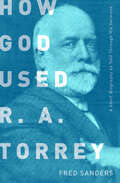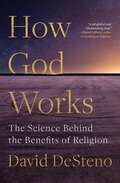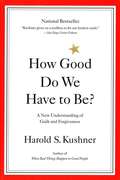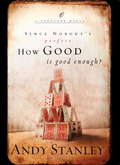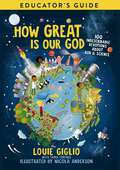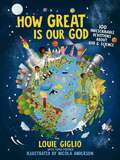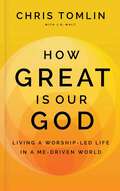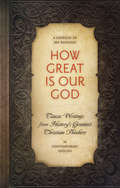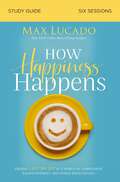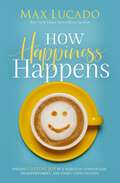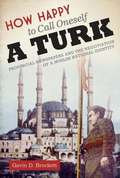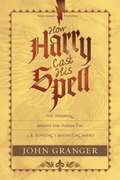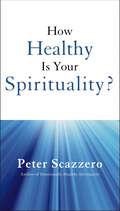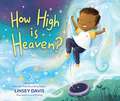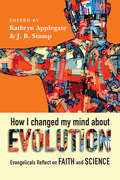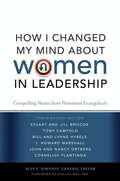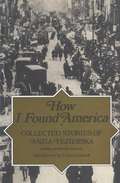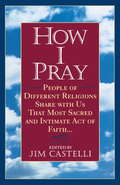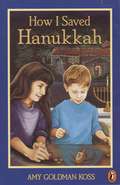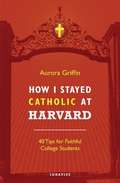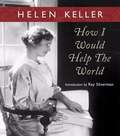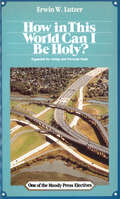- Table View
- List View
How God Used R.A. Torrey: A Short Biography as Told Through His Sermons
by Fred SandersSermons to change you, a life to inspire you.Scholar, expositor, storyteller, and evangelist, R. A. Torrey was a master-of-all-trades minister. Crowds worldwide called his preaching &“that famous Torrey thing.&” And that famous Torrey thing won souls. Inside are the most famous, influential, and characteristic of his sermons. Though nearly a century old, they challenge us anew from Scripture and are greatly instructive to any who preach. Drawn from various periods of Torrey&’s ministry, and prefaced with bibliographic commentary, these sermons paint a portrait of a man gripped by God. But even more they grip the reader. They take us into the great halls where God&’s Word bellowed forth from Torrey and left his audiences hushed. It&’s no wonder that Torrey caught the attention of the great evangelist D. L. Moody. Be ready to be provoked. Like an archer who strikes with both accuracy and force, Torrey preached with clarity while cutting deep to the heart. Behind the bow you&’ll see a man fully sold on the kingdom of God, and you&’ll be inspired to follow suit.
How God Works: The Science Behind the Benefits of Religion
by David DeStenoDrawing on a wealth of new evidence, pioneering research psychologist David DeSteno shows why religious practices and rituals are so beneficial to those who follow them—and to anyone, regardless of their faith (or lack thereof).Scientists are beginning to discover what believers have known for a long time: the rewards that a religious life can provide. For millennia, people have turned to priests, rabbis, imams, shamans, and others to help them deal with issues of grief and loss, birth and death, morality and meaning. In this absorbing work, DeSteno reveals how numerous religious practices from around the world improve emotional and physical well-being. With empathy and rigor, DeSteno chronicles religious rites and traditions from cradle to grave. He explains how the Japanese rituals surrounding childbirth help strengthen parental bonds with children. He describes how the Apache Sunrise Ceremony makes teenage girls better able to face the rigors of womanhood. He shows how Buddhist meditation reduces hostility and increases compassion. He demonstrates how the Jewish practice of sitting shiva comforts the bereaved. And much more. DeSteno details how belief itself enhances physical and mental health. But you don&’t need to be religious to benefit from the trove of wisdom that religion has to offer. Many items in religion&’s &“toolbox&” can help the body and mind whether or not one believes. How God Works offers advice on how to incorporate many of these practices to help all of us live more meaningful, successful, and satisfying lives.
How Good Do We Have to Be? A New Understanding of Guilt and Forgiveness
by Harold S. KushnerHere is the introduction to the book: INTRODUCTION I HAVE BEEN THINKING about the ideas expressed in this book for a long time. Even as a child, I was bothered by the biblical story of the Garden of Eden. A God who punished people so severely for breaking one arbitrary rule was not a God I wanted to believe in, especially since the story seemed to suggest that Adam and Eve had no knowledge of what good and bad meant before they broke the rule. As I grew older, I encountered so many instances of people doing what they thought God had done in the Bible, rejecting someone for making one mistake, for not being perfect. When I was rabbi of a congregation in suburban Boston and members of my synagogue would share their problems with me, I would repeatedly hear of children angry at their parents, parents disappointed in their children, husbands and wives upset with each other, brothers not inviting brothers to a wedding because of an argument that had taken place years earlier. The pattern tended to be the same: somebody did something wrong and someone else responded by withdrawing love, sometimes by withdrawing all contact. And the retaliator felt justified in doing that because, after all, hadn't God done the same thing in the Garden of Eden? I often felt frustrated at the inability of my religious perspective to heal that breach. Fifteen years ago, responding to a personal tragedy, I wrote a book called When Bad Things Happen to Good People. Its message was simple but radical: when something bad happens to you, it is not a case of God punishing you because you deserve it. God is on your side, not on the side of the illness or the injury. This book can be seen as an extension of that earlier one. Its message is equally simple and equally radical: God does not stop loving us every time we do something wrong, and neither should we stop loving ourselves and each other for being less than perfect. If religious teachers tell us otherwise, that is bad religion. If our parents responded to our misbehavior by withdrawing their love, that was a bad response by people who may otherwise have been good parents. I hope that our sense of self-worth, our relationships to our parents, our children, our mates, our siblings, and friends will improve once we learn the lesson that one mistake need not lead to rejection and banishment. And I hope that this book will guide you to gaining that blessing.
How Good Is Good Enough?: Since Nobody's Perfect . . . (Lifechange Bks.)
by Andy StanleySurely there's more than one way to get to heaven? Bestselling author Andy Stanley addresses this popular belief held even among Christians. But believing that all good people go to heaven raises major problems, Stanley reveals. Is goodness not rewarded, then? Is Christianity not fair? Maybe not, he says. Readers will find out why Jesus taught that goodness is not even a requirement to enter heaven - and why Christianity is beyond fair. Andy Stanley leads believers and skeptics alike to a grateful awareness of God's enormous grace and mercy. Good People Go to Heaven... Don't They? Sure they do. It only makes sense. Actually, it doesn't really make any sense at all. Smart, educated, accomplished men and women everywhere are banking their eternities on a theory that doesn't hold water. Chances are, you've never really thought it through. But you owe it to yourself to do so. Find out now what's wrong with the most popular theory about heaven--and what it really takes to get there.
How Great Is Our God Educator's Guide: 100 Indescribable Devotions About God and Science
by Louie GiglioHow Great Is Our God Educator's Guide is a companion to How Great Is Our God: 100 Indescribable Devotions About God and Science by Louie Giglio. This guide can be utilized in the classroom, in a home school setting, or by parents seeking additional resources. Ideal for grades 3rd-5th.
How Great Is Our God: 100 Indescribable Devotions About God and Science (Indescribable Kids)
by Louie GiglioShow the children in your life the awe-inspiring connection between the natural world and the God who created it. The bestselling children's devotional Indescribable: 100 Devotions About God and Science resonated with more than 200,000 kids, parents, and teachers. Now Louie Giglio offers 100 more devotions about God and science that will expand the curiosity of your 6- to 10-year-olds. Including amazing scientific facts, beautiful photography, fun illustrations, and simple activities, How Great Is Our God covers topics likeSpace and timeEarth and weatherThe human bodyAnimalsPlantsAnd more!With this science devotional, which is based on Giglio's well-known "How Great Is Our God" and “Indescribable” messages, children will embark on a journey to discover more about God and His incredible creation. From the pink lake in Senegal to the earth's trip around the sun to the water-holding frog that can live up to five years without a drink, the wonders of the universe will deepen your kids’ appreciation for God's wild imagination.
How Great Is Our God: Living a Worship-Led Life in a Me-Driven World (Noteworthy Greetings Ser.)
by Chris TomlinRecenter God in your life with How Great Is Our God: Living A Worship-Led Life In a Me-Driven World by Grammy Award-winning worship artist Chris Tomlin. In this intimate look at his songs, Tomlin shows how worship music is more than just music but a tool for putting God first.Living in a me-driven world means being the king of a small, earthbound kingdom. Chris Tomlin posits that when you choose to live a worship-led life instead, you will eventually gain welcome to God&’s eternal kingdom. After spending over two decades as one of the most successful worship musicians in the market, he&’s learned that he wasn&’t just called to sing but to lead others to God. He shows with his writing how God is all around us, encouraging us to reject the worldly notion of living for ourselves and instead decide to live for Him. Tomlin uses his experience as a worship artist to detail what it means to truly live a worship-led life, including: Exploring how his songs emphasize a God-centered life, Explaining how Christians can redefine worship in their everyday lives, And breaking down Bible verses that celebrate God&’s greatness. How Great Is Our God calls readers to remember the true meaning of worship—singing God&’s praises both inside and outside of church. When you live a me-driven life, you choose to focus on yourself, but when you live a worship-led life, you choose to focus on God and others. Follow along with Chris Tomlin as he considers the importance of reshaping your world around God and laying yourself at His feet.
How Great is Our God: Classic Writings from History's Greatest Christian Thinkers in Contempory Language
by Worthy BooksIn a pluralistic culture with competing beliefs and values, there is a desire to get back to basics-the classic expressions of the Christian faith. This 365-day devotional introduces readers to the minds and hearts of many of the most influential thinkers in church history. Each reading, modernized for today's audience, takes readers through two millennium of riches-from the early church fathers through the Medieval thinkers and the great councils, and on into the Reformation, the Renaissance, and the birth of the modern mind. An elegant edition for the nightstand, the desktop, or the coffee table, How Great Is Our God is one part historical tour, one part devotional, one part guide for living, and one part gift book. It will appeal to every Christian who wants to hear the hearts and discover the classic voices of Christianity through the ages.
How Green is My Mountain
by Ruth KlaasenFrom the windswept Canadian prairies to the University of Saskatchewan, from McGill University to the Philippines and Mt. Banahaw--the mountain that becomes her mountain for a very special reason... Ruth Klaasen weaves a story of joy and romance, boldness and humility, hardship and sickness, birth and death. More than a story, this account takes us into the life and lifestyle of a North American family who lived for Jesus Christ in an international community in a foreign country. Struggles with assimilating a new and very different culture, failures to communicate with servants and neighbors, questions of conflicting values, difficulties of explaining the gospel, the issue of what church to join--these blend together with problems we all face in realizing God's presence in our lives.
How Happiness Happens Bible Study Guide: Finding Lasting Joy in a World of Comparison, Disappointment, and Unmet Expectations
by Max LucadoThere's a path to happiness that always delivers.Our culture tries to convince us there is one way to happiness: aspire, acquire, desire, retire. We're told that happiness depends on what we hang in our closet, park in our garage, and deposit in our bank account. Yet it's a path that always fails to deliver.In this video Bible study, (DVD/video streaming sold separately) bestselling author Max Lucado looks at several compelling passages in the Bible that reveal how the happiest people on earth aren't those who have the most but those who are willing to give the most away.Max also uses Scripture to show us how to address some of the most common sources of unhappiness, such as:Dealing with difficult people.Coping with tough circumstances.Overcoming low self-esteem.Managing stress.God wants to bring joy to the people of this generation. In his Word, he has given us practical and applicable ways to discover that joy by sharing it with others. Although the world can be a lonely and disappointing place, we can be God's representatives to bring about a cascade of kindness! While we won't be able to solve every problem, we can bring a few smiles to a few faces—and in this way, we might even initiate our own quiet revolution of joy.How Happiness Happens is perfect for small groups of friends or church groups who want to get to know each other better, and for introverts and extroverts alike. This study guide includes:Video teaching notes and discussion questions.Bible exploration.Weekly personal study and reflection materials.Designed for use with the How Happiness Happens Video Study (9780310105732), sold separately. Streaming video also available.
How Happiness Happens: Finding Lasting Joy in a World of Comparison, Disappointment, and Unmet Expectations
by Max LucadoIn a world searching for happiness, bestselling author Max Lucado provides a personal plan for a life filled with lasting and fulfilling joy, supported by Jesus’ teaching and modern research.Do you feel happy?How long has it been since you felt a level of contagious, infectious, unflappable, unstoppable happiness? Maybe your answer is, “All the time.” If so, God bless you! (And consider suggesting this book to someone who needs it.) For many of us the answer is, “Well, it’s been a while. I used to be happy, but then life took its toll.”Only one-third of Americans surveyed said they were happy. How can this be? Education is accessible to most. We’ve made advancements in everything from medicine to technology, yet 66 percent of us can’t find an adequate reason to check the “yes” box on the happiness questionnaire.Worldwide, people profess that happiness is their most cherished goal. Marketers get this. “Want to be happy?” they ask. Eat at this restaurant, drive this car, wear this dress. Happiness happens when you lose the weight, get the date, find the mate, or discover your fate. It’s wide, this way to happiness. Yet, for all its promise, it delivers a fragile joy; here one day, tomorrow scattered by the winds of comparison, disappointment, or unmet expectations.Max writes, “There is another option. It requires no credit card, monthly mortgage, or stroke of fortune. Age and ethnicity aren’t factors...an unexpected door to joy.” In this book Max shares the unexpected path to a lasting happiness, one that produces reliable joy in any season of life. Based on the teachings of Jesus and backed by modern research, How Happiness Happens presents a surprising but practical way of living that will change you from the inside out. Also available in Spanish.
How Happy to Call Oneself a Turk
by Gavin D. BrockettThe modern nation-state of Turkey was established in 1923, but when and how did its citizens begin to identify themselves as Turks? Mustafa Kemal Ataturk, Turkey's founding president, is almost universally credited with creating a Turkish national identity through his revolutionary program to "secularize" the former heartland of the Ottoman Empire. Yet, despite Turkey's status as the lone secular state in the Muslim Middle East, religion remains a powerful force in Turkish society, and the country today is governed by a democratically elected political party with a distinctly religious (Islamist) orientation. In this history, Gavin D. Brockett takes a fresh look at the formation of Turkish national identity, focusing on the relationship between Islam and nationalism and the process through which a "religious national identity" emerged. Challenging the orthodoxy that Ataturk and the political elite imposed a sense of national identity from the top down, Brockett examines the social and political debates in provincial newspapers from around the country. He shows that the unprecedented expansion of print media in Turkey between 1945 and 1954, which followed the end of strict, single-party authoritarian government, created a forum in which ordinary people could inject popular religious identities into the new Turkish nationalism. Brockett makes a convincing case that it was this fruitful negotiation between secular nationalism and Islam--rather than the imposition of secularism alone--that created the modern Turkish national identity.
How Harry Cast His Spell: The Meaning Behind the Mania for J. K. Rowling's Bestselling Books
by John GrangerTracing spiritual content and symbols through the entire series, Granger uses his knowledge of classic literature, philosophy, and Christian tradition to explain why the books 1) meet our longings to experience the truths of life, love, and death; 2) help us better understand life and our role in the universe; and 3) encourage us to discover and develop our own gift and abilities. A must-read book for fans, parents, and teachers that will serve as a bridge to growth in faith and spiritual understanding.
How Healthy is Your Spirituality?
by Peter ScazzeroAfter almost three decades of pastoring New Life Fellowship Church in the bustle of New York City, Peter Scazzero discovered that most people are missing the deep emotional change that can happen in their walk with Jesus.Scazzero found two truths to be true: you can't be spiritually mature while remaining emotionally immature, and unless you slow and quiet your life down for a direct relationship with Jesus Christ, little change is possible. The integration of these two truths unleashed a spiritual revolution in Scazzero, in his church, and now in thousands of other churches.In this booklet based on his bestselling book Emotionally Healthy Spirituality, Scazzero helps readers identify the top ten symptoms of emotionally unhealthy spirituality and what they can do about them. He includes an assessment for readers to take to find out how emotionally healthy they really are and seven devotions to lead them on the journey to health.
How High is Heaven?
by Linsey DavisChildren ask A LOT of questions when it comes to heaven, particularly when they&’ve experienced the loss of a loved one. In this uplifting, imaginative picture book, How High Is Heaven? inspires hope and comfort in readers young and old, that heaven can be experienced here and now and is open for us all.New York Times bestselling author and ABC News anchor Linsey Davis invites children to explore age-appropriate questions about heaven. Kids and their parents can celebrate that heaven is a place we can look forward to, by God&’s grace and goodness, while finding moments of heaven here on earth.How High Is Heaven? is the perfect book for parents and grandparents to read aloud and provides an uplifting message for kids ages 4-8, featuring:Read-aloud, lyrical rhymesWhimsical, engaging illustrations by Lucy FlemingAnswers to children&’s questions about heaven… and a safe place to ask themComfort to those who have lost a loved one?Look for additional inspirational children&’s picture books and audio products from award-winning author Linsey Davis:The World Is Awake, A Celebration of Everyday BlessingsOne Big Heart, A Celebration of Being More Alike Than DifferentStay This Way ForeverThe Linsey Davis Children&’s Audio CollectionThe Smallest Spot of a Dot
How I Changed My Mind About Evolution: Evangelicals Reflect on Faith and Science (BioLogos Books on Science and Christianity)
by J. B. Stump Deborah Haarsma Kathryn ApplegateFrancis CollinsDeborah HaarsmaDenis LamoureuxJohn OrtbergKen FongLaura TruaxN. T. WrightScot McKnightTremper Longman IIIJames K. A. SmithAmos YongOliver Crisp
How I Changed My Mind about Women in Leadership: Compelling Stories from Prominent Evangelicals
by Dallas Willard Alan F. JohnsonThis book features a number of autobiographical accounts as to how various persons have come to change their minds about women in leadership. Well-known Evangelical leaders—individuals and couples, males and females from a broad range of denominational affiliation and ethnic diversity—share their surprising journeys from a more or less restrictive view to an open inclusive view that recognizes a full shared partnership of leadership in the home and in the church based on gifts not gender. This book offers a positive vision for the future of women and men together as partners of equal worth without competitiveness in the work of equipping this and the next generation of Christian disciples for the ‘work of ministry’ and service in the Kingdom of God.
How I Found America: Collected Stories of Anzia Yezierska
by Anzia YezierskaThe Jewish immigrant experience in all its joy and pain has been captured beautifully in Yezierska's work. Her stories and novels, written from the 1920s to the 1960s, immortalized the immigrant Jews of the Lower East Side of New York, particularly the women.
How I Pray
by Jim CastelliReligion writer Jim Castelli set out to answer these profound questions by talking with twenty-six spiritual leaders and practitioners representing the wide spectrum of faith in America today. How I Pray gathers these remarkable conversations into a thought-provoking, personal, and deeply meaningful volume.In How I Pray Christians and Jews, Muslims and Buddhists, Native Americans and Mormons, and members of many other faiths describe the intimate and unique ways in which they pray -- and what prayer means to them. Catholic priest and novelist Andrew M. Greeley reveals that he prays to a womanly God because it enhances the intimacy of his spiritual encounters. Pollster George Gallup, Jr., considers his prayer life a dynamic two-way conversation with God. Lakota Sioux medicine man High Star shares the fascinating prayer rituals that his people have practiced for centuries.Infused with honesty and passion, warmth, and a deep reverence for life's spirituality, How I Pray is sure to be a source of illumination and delight for readers of all religious backgrounds.
How I Saved Hanukkah
by Amy Goldman Koss Diane DegroatA Hanukkah to remember - finally! Marla Feinstein, the only Jewish kid in her fourth-grade class, knows what this holiday season will be like. While everyone else is decorating trees and hanging stockings, she'll be forgetting to light the candles and staring at a big plastic dreidel. But when Marla decides to learn what the Hanukkah traditions are really about, things change fast. Soon she's got her family turning latkes into Hanukkah Performance Art and doing a wild hora. And by the end of this funny and heartwarming novel, the Festival of Lights is the biggest party in town!
How I Stayed Catholic At Harvard: 40 Tips For Faithful College Students
by Aurora GriffinA Harvard graduate, Rhodes Scholar at Oxford University, and devout Catholic tells you everything you need to know about keeping your faith at a modern university. Drawing on her recent experience, Aurora Griffin shares forty practical tips relating to academics, community, prayer, and service that helped her stay Catholic in college.
How I Would Help the World
by Helen Keller Ray SilvermanHelen Keller's life was deeply changed when she began to read the writings of Emanuel Swedenborg in braille. Referring to him as "one of the noblest champions true Christianity has ever known," she said, "Swedenborg's message has been my greatest incitement to overcome limitations." Certainly, Helen Keller did much to help the world. But she felt she could help the world most by sharing with others the inspiration that came to her through reading Swedenborg's books. "Were I but capable," she said, "of interpreting to others one-half of the stimulating thoughts and noble sentiments that are buried in Swedenborg's writings, I should help them more than I am ever likely to in any other way. It would be such a joy to me if I might be the instrument of bringing Swedenborg to a world that is spiritually deaf and blind." Her essay, How I Would Help the World, is her attempt to do this. It is accompanied by an introduction by scholar Ray Silverman elucidating Helen Keller's spiritual process. This glimpse into the spiritual life of Helen Keller provides inspiration for those who may have wondered how she was able to find the strength and courage to overcome her triple handicap. Pictures of Helen Keller and direct quotations from the writings of Emanuel Swedenborg accompany her poignant words.
How I wish you had known me (DRAMA / Gay & Lesbian #1)
by Gilberto SantosIs it possible to fall in love with someone who's already gone? Lucas and Lauro never met, not in this life... But what would only be an uncompromising holiday trip in the interior of São Paulo turns around the life of Lauro, a psychologist always willing to help. His beliefs are to put to the test amid events that defy logic. After being involved in a mysterious suicide that would hit the small town of Vinhedo, his help to the dead's family would not end as expected; soon Lauro would be involved and in love with Lucas. On the other side, unknowingly, it would also be helping his soul mate to rise spiritually. Follow and be moved by this story, which leaves no doubt that death is just a journey and that soul mates really exist
How In This World Can I Be Holy?
by Erwin W. LutzerChristians today face a huge challenge—the challenge to resist the gravitational pull of the world; the challenge to be holy in a world of sin. This book will call you to a committed, personal Christianity. It will challenge you to rise above humdrum religion and become an instrument of God. Says Warren Wiersbe, noted author and speaker, "This is the best book on contemporary Christian living I have read in years."
How In This World Can I Be Holy?
by Erwin W. LutzerChristians today face a huge challenge—the challenge to resist the gravitational pull of the world; the challenge to be holy in a world of sin. This book will call you to a committed, personal Christianity. It will challenge you to rise above humdrum religion and become an instrument of God. Says Warren Wiersbe, noted author and speaker, "This is the best book on contemporary Christian living I have read in years."
